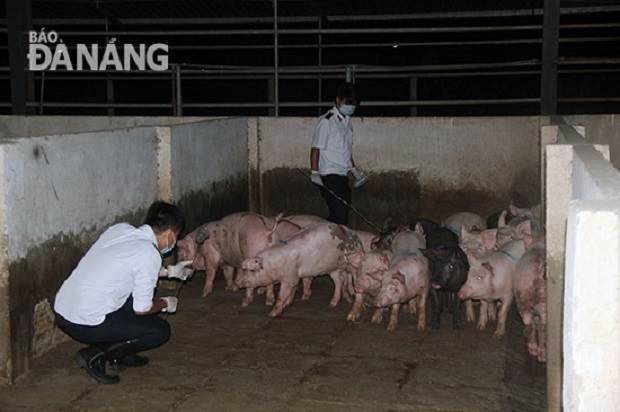Stronger measures taken to ensure local food safety
On Thursday, Da Nang People's Committee Vice Chairman Dang Viet Dung met with representatives from local relevant agencies to discuss effective measures to ensure food safety and hygiene in the city.
 |
| Taking samples at the Da Son slaughter house |
Between January and October, 80% of the city’s agricultural production households, breeding establishments, and seafood production businesses signed commitments to ensure food safety.
Over the 10-month period, the municipal Department of Agriculture and Rural Development took 7 samples of vegetables from local vegetable growing areas to check for chemical residues and biological contaminants. In addition, samples from 188 cabbages transported from Da Lat City were taken, but only one of them was found with difenoconazole exceeding allowable limits. Also, urine samples were taken from livestock at local slaughterhouses and no prohibited substances were found.
The department’s inspection teams visited 19 local business establishments to check food safety and hygiene, and 4 of them were found to be violating the city’s regulations.
Regarding the city’s efforts to further the effective management of food safety and hygiene during November, Vice Chairman Dung urged the municipal Fatherland Front Committee to increase publicity amongst local relevant agencies and residential groups to raise awareness of the issue.
The city leader stressed the need for the city-based departments and agencies to enhance their State management responsibilities for food safety. Importance will be attached to providing training courses for the local employees involved in order to enhance their professional skills.
Mr Dung asked the district authorities of Ngu Hanh Son and Son Tra to recheck the operations of seafood traders and restaurants in their localities and require them to sign commitments to ensure food safety for their customers. Also, more inspection visits should be made to such establishments.
The municipal Department of Information and Communications was urged to develop some management software to help local authorities tighten the operation of local livestock breeding farms, food trading and processing establishments, and restaurants. The focus will be on collecting databases on business categories and scales, their product types, and their observance of the city’s regulations on food safety, as well as the number of their workers who have already taken training courses on the subject. Once fully operational, the software will provide visitors to Da Nang with all the necessary information about food safety at these establishments and restaurants.
Vice Chairman Dung also asked the city’s Department of Health to develop detailed plans for helping 5 local vegetable growing areas to meet Viet Nam’s good agricultural practices (VietGap) standards.
Meanwhile, the Department of Industry and Trade was urged to complete the necessary procedures to appeal for public investment into the city’s Hoa Cuong Wholesale Market, ensure food safety at this market, and tighten the management of its traders both inside and outside.
In addition, Mr Dung stressed the need for the Department of Agriculture and Rural Development to help local farmers to effectively treat livestock waste. Also, great efforts should be made to work closely with the city’s Fisheries Association to check the source of the fish caught before it is transported to local markets.